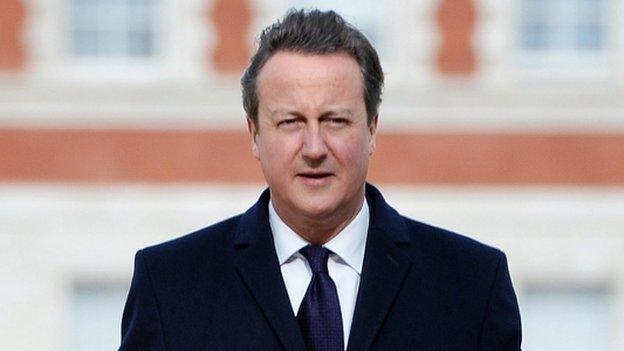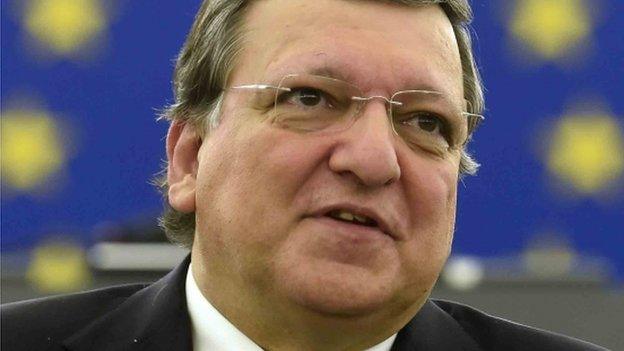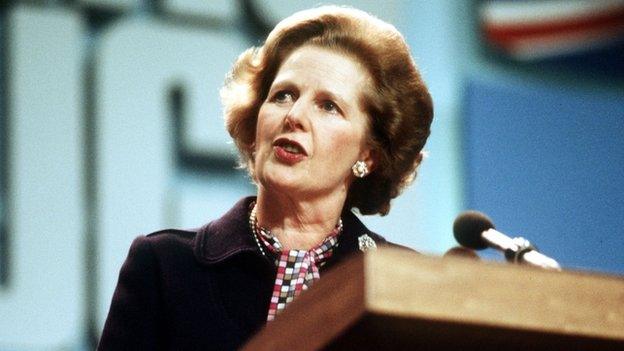Is EU challenge too much for Cameron to stomach?
- Published
- comments

Europe presents David Cameron with a difficult balancing act
For a long while now I've realised that David Cameron has a porridge problem, just like Goldilocks.
But now it is becoming clear that Baby Bear may not be around to save him. Let me explain.
The prime minister is to make a speech before Christmas setting out a tough new line limiting immigration from other European countries, a centrepiece of his plan to renegotiate Britain's relationship with the European Union.
After that, he'll ask the British people, "Should we stay, or should we go?" in a referendum in 2017.
This is the porridge problem.
Anything that would satisfy the tastes of his more eurosceptic MPs, and perhaps voters, is likely to be too hot for other European countries to sup.
But cool ideas that might find buyers in Brussels may seem too lukewarm, offensively tepid, back at home.
It is hard to see what would have everybody sighing with relief and declaring: "Ah, just right."
The deal he's looking for will not just be about immigration, but it is the toughest nut to crack.
Yes, he can get something restricting access to benefits.
Yes, he can get something restricting workers from new countries that join the EU.
Given Serbia is the next to join, but not for five years at the very least, this lacks a certain dramatic value.
I would suggest "No Serbs until 2025" is not a rallying cry to win a referendum.
Sacred principle
Various ideas have been floated, including an emergency brake on EU immigration, external, a limit on National Insurance numbers and the Croatian solution.

Jose Manuel Barroso says freedom of movement is at the heart of the European project
The problem is that while I could bore you to death with the technical details, really all you need to know is that they breach a sacred principle - free movement of people, external.
The fuss when the outgoing President of the Commission, Jose Manuel Barroso, declared on the BBC that "any kind of arbitrary cap seems to me to be not in conformity with European laws" was telling.
It was picked up and chewed over by every commentator. It is telling because it was clear that few of them had ever spoken to anyone, as they might have it, in Brussels, but also not in Berlin, Paris, Warsaw or any other European capital.
Mr Barroso was not making some outrageously contentious and provocative remark but just stating the obvious.
To most politicians in the European Union, the right of EU citizens to go and live and work in another EU country is fundamental.
In any case, the man coming in is more important than the man going out.
And new Commission President Jean-Claude Juncker has said freedom of movement within the EU is "a basic principle" of European co-operation and "will not be changed".
But what the governments of nation states think is even more important.
When I spoke to Poland's ambassador to the UK, Witold Sobkow, on BBC Radio 4's The World This Weekend he sounded very conciliatory, making it clear his country regarded the UK as a valued ally and friend, and that it would do what it could to keep it in the EU.
But he said free movement was part of a puzzle, adding: "There are some things we can do, and some things we shouldn't do."
Balancing act
He made it clear that anything had to be applied to all EU countries and free movement was a fundamental principle.
The point is this. For most members of the EU the single market is a balancing act.
On one side you have the free movement of capital, on the other the free movement of labour.
To put it crudely: "We let your companies in, you let our people in." Although few would see it as a one-way street.
Now, simply observing that it is a fundamental principle doesn't mean it can't be changed, or that Mr Cameron is doomed to defeat.
These people are politicians after all.

Would Margaret Thatcher have argued for the free market?
They really don't want Britain to leave the EU.
While we will endure endless debates about how much damage or benefit Britexit would mean for us, one thing is sure.
It would deal a really serious blow to the EU.
Any fleeting, gleeful schadenfreude at the thought of the awkward squad slinking out the door is quickly replaced by a sinking feeling - the realisation that Beijing and Washington would look on a diminished, navel-gazing Europe with horror and contempt.
But Mr Cameron does not appear to be going out of his way to find a seriously temperate porridge.
There are at least two things about our prime minister that irritate his European allies.
Firstly, that he seems to view diplomatic preparation rather as some teenagers approach their homework.
If it is done at all, it is scribbled on the bus to Brussels - "the dog ate my strategy" is not regarded as respectful.
Few aides are dispatched to foreign capitals to quietly take the temperature.
EU leaders complain that he just seems to sound off to the British press to get a good headline the next day - knowing most of the press won't press - and then he scrabbles to construct a policy to suit. Or in this case doesn't.
The second thing that has his critics scratching their heads is why he doesn't get the single market.
The Sun describes Mr Barroso, with complete accuracy, as a "former Portuguese communist".
It fails to mention that his youthful Maoist fling was when his country was a Fascist dictatorship, and he long ago discovered the joys of the free market.
He is a pragmatic centre-right former prime minister who thinks of himself as rather a fan of the Anglo-Saxon model of less government, more competition.
What irritates him is that he thinks British politicians are winning all the arguments in Europe but would rather pretend they are hard done by and beaten, in order to get brownie points from the backbenchers.
I have no idea whether Mr Barroso is right that Mrs Thatcher would have fought against UKIP and for the free market. Maybe not.
Conservative soul
What is true is that at certain times in the past, British Conservatives would salivate at the thought of energetic, young skilled workers willingly doing a job more cheaply than those who were older, less skilled.
It would have been the left who were horrified, while Old Labour was originally opposed to joining that Capitalist Club, the Common Market.
Now economics and nationalism war in the conservative soul.
Given that background, it is hard to see how Mr Cameron finds a porridge that is not too hot, not too cold, but just right.
As far as I can see, his strategy relies on the European Commission, the European Parliament and most importantly the prime ministers and presidents of 27 other countries all agreeing that the threat of him taking his ball away is so profound that they should tear up some basic rules, even though that probably means a treaty change, which might require referendums in other countries that could throw Europe into more turmoil.
This complexity would mean Mr Cameron could win concessions that were thrown out by, say, the people of Ireland.
So it is a pretty big gamble, which leaves me wondering if he even wants to win a referendum.
This porridge problem only matters if he wins the next election.
If he doesn't, he has a difficultly with another breakfast staple. As one insider told me recently: "If he loses, he's toast."